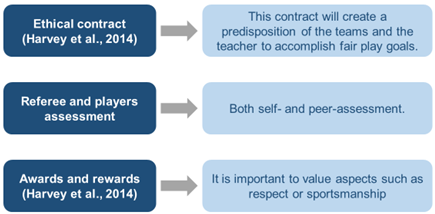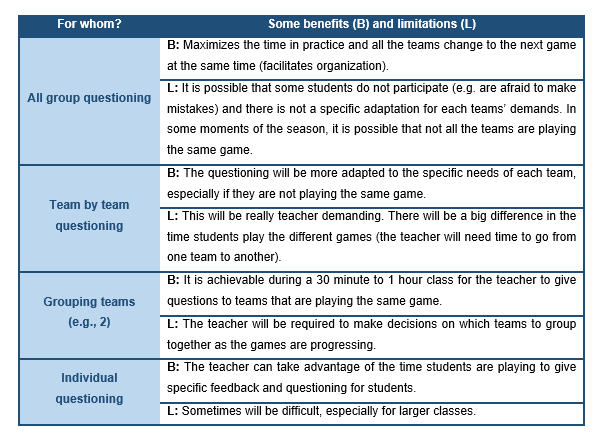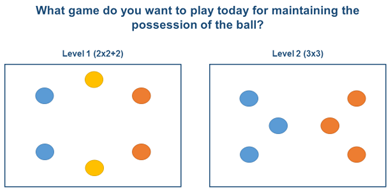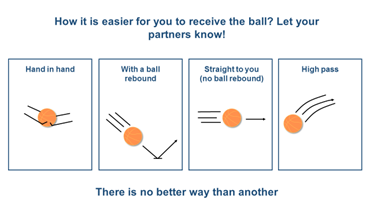University of Castilla-La Mancha and University of La Rioja
Twitter: @eguijarro_pe
Researchgate: https://www.researchgate.net/profile/Eva-Guijarro-Jareno
I will outline the importance of developing respectful relationships to foster a healthy class environment, to consider group sizes and their associated benefits and limitations when posing questions for learning and encouraging autonomy at both team and student level.
For specific results about this learning experience, visit the recently published paper of Guijarro et al. (ahead of print) in the Journal of Teaching in Physical Education.
1. Developing respect and fair play:
It is essential for this combination of models to work together to develop students’ respect for their team, for other teams, and for the referee.
First, students must respect other teams when playing small-sided games. They have to understand that they cannot interrupt other teams’ practice while they are playing, and if they lose the ball, they should wait at the side of their home area to recover it. This aspect will facilitate the organization in class and the correct development of small-sided games. Second, we have to teach students to respect other teams and the referee. If there are no other teams to play with, there is no basketball. In addition, the decisions of the referee have to be respected by all the players, but referees must preserve their neutrality and not be influenced by friendships. These aspects will create a healthy environment in the class. Some specific strategies can be used:
When we use a combined use of Teaching Games for Understanding and Sport Education, a question that might come to our head is “How do I incorporate questioning? To the whole group, team by team…
The table below lists different ways in which questioning can be incorporated during mixed gender and ability teams (suggested by Sport Education), and some of the benefits and limitations for each one. The use of the different ways can change through the season and might depend on students’ progression or the organization of the class.
Progression of tactics and skills: from easy to an increased difficulty.
Teaching Games for Understanding and Sport Education are grounded on constructivist theories, hence previous students’ knowledge must be considered. It is important to integrate new tactics and skills based on students’ previous experiences.
This section will focus on two levels.
(a) At the team level: when a degree of autonomy is achieved, students can select the game to play from a proposed dossier of games or create their own games. Figure 2 shows an example of two different games that students can select for achieving a specific purpose.
In conclusion, several aspects must be considered in the application of the combination of Teaching Games for Understanding and Sport Education Model. First, it is important to develop respectful relationships to create a healthy class environment, which allows the season to run as intended. Since there are different levels of ability or motivation in class, it is important that the activities or games are adapted do everyone’s abilities. Finally, from the teacher’s perspective, it is essential to consider how questioning will be incorporated, especially considering the size of the group and students’ development.
Gil-Arias, A., Harvey, S., García-Herreros, F., González-Víllora, S., Práxedes, A., and Moreno, A. (2021). Effect of a hybrid teaching games for understanding/sport education unit on elementary students’ self-determined motivation in physical education. European Physical Education Review, 27(2), 366-383. https://doi.org/10.1177/1356336X20950174
Guijarro, E., MacPhail, A., González-Villora, S., and Arias-Palencia, N. M. (ahead of print). Exploring Games Performance and Game Involvement: Effects of a Sport Education Season and a Combined Sport Education – Teaching Games for Understanding Unit. Journal of Teaching in Physical Education. https://doi.org/10.1123/jtpe.2020-0170
Harvey, S., Kirk, D., and O’Donovan, T. M. (2014). Sport Education as a pedagogical application for ethical development in physical education and youth sport. Sport, Education and Society, 19(1), 41-62. https://doi.org/10.1080/13573322.2011.624594






